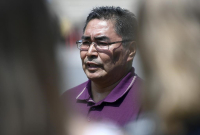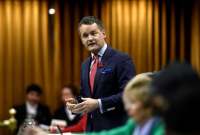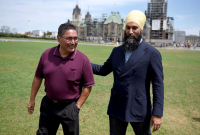Support strong Canadian climate journalism for 2025
With the front-runners catching their breath, the battle for third place seized the campaign spotlight Saturday as the NDP and the Green party each promised a new deal of sorts for Indigenous Peoples in Canada.
In northern Ontario, NDP Leader Jagmeet Singh assailed the Liberal record on improving the lives of First Nations communities as he committed to ensuring universal access to clean drinking water, promising to act faster and more effectively than the Trudeau government.
But in British Columbia and not to be outdone, Green Leader Elizabeth May went one better, promising her government would end the era of "colonial oppression" and dismantle the Indian Act.
Liberal Leader Justin Trudeau took the day off from campaigning and Conservative Leader Andrew Scheer made a few brief stops in eastern Ontario, but unveiled no announcements, leaving Singh and May to talk policy for the day.
Singh visited Grassy Narrows First Nation, where residents have dealt with the health effects of mercury poisoning from contaminated water for decades. The federal government and Grassy Narrows have struggled to reach an agreement on building a treatment centre for victims of the mercury from an upstream paper mill, and the chief of the First Nation, Rudy Turtle, is running for the New Democrats against Liberal Bob Nault.
Singh promised an NDP government would immediately spend $19 million to fund the centre, but he also vowed to do "whatever it takes" to ensure that everyone has clean drinking water.
"There's no excuse in 2019, with the wealth we have as a nation, with the technology we have as a country, that we cannot clean this water, ensure that all communities have clean drinking water," Singh said.
He pointed to a parliamentary budget office estimate of $1.8 billion as the capital costs needed to accomplish that goal, and said the government should "absolutely" be able to find that money to pay for something so important.
Singh said there would be no question of immediately providing funding if unclean drinking water was a problem in major Canadian cities, but the government has so far failed to apply the same urgency to reserves.
There are currently 56 long-term boil water advisories on reserves across the country.
May also discussed Indigenous issues Saturday, promising that the Greens would allow communities to opt out of the Indian Act as part of its strategy for reconciliation.
"Greens reject the Indian Act and are committed to dismantling this racist and oppressive legislation in full partnership and with First Nations taking the lead role in the process," the party said in a statement.
The Greens have also pledged to re-introduce legislation to implement calls to action of both the Truth and Reconciliation Commission and the Inquiry into Missing and Murdered Indigenous Women and Girls, and enshrine the tenets of the United Nations Declaration on the Rights of Indigenous Peoples into law.
Scheer started his day at the official opening for a Buddhist temple in eastern Ontario, then planned to hit up a pizza shop and a fall festival. But the Tories also put Alberta Premier Jason Kenney to work, attending a fundraiser in the west Toronto area of Etobicoke — home to that province's premier.
Doug Ford has said he would stay out of the federal election, but his public appearances have been especially sparse of late.
Ford's popularity took a hit following cuts included in his spring budget, and tensions in the province were particularly high over the weekend, with a looming education worker strike and potential school closures.
Polling has suggested that Ford may be hurting Scheer's chances in Ontario, and the Liberals frequently try to link the two leaders.
They dispatched Mark Holland, running for re-election in Ajax, to make remarks outside Kenney's event.
"This is Ontario — for an Alberta premier to be coming and campaigning is highly unusual," Holland said. "We'd like to hear from Doug Ford, who is the premier of this province, but he's nowhere to be seen. He isn't coming to events, he's not showing up and talking about his record, and there's a very clear reason why."
Scheer himself capped off a difficult week by defending his party's vetting process after the Conservatives fired a B.C. candidate who had made slurs against LGBTQ people.
Over the past week Scheer was also confronted by the revelation he is in the process of renouncing his dual American-Canadian citizenship and confirmed that he has "pro life" views, something he had previously avoided saying.
This report by The Canadian Press was first published Oct. 5, 2019.





Comments
Singh's promise is identical to that of the Liberal Government which has already done 3/4 of the work. The Liberals will end all long-term drinking water advisories by 2021. Singh's commitment would be most easily fulfilled by simply reelecting the Liberals.
https://www.sac-isc.gc.ca/eng/1506514143353/1533317130660